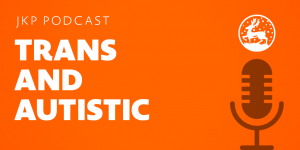We’re joined on the podcast by Laura Kate Dale, an author who identifies as trans, gay and autistic. We discussed the crossover between trans and autism, late diagnosis, light-bulb moments, Japanese anime, feminine presentation and passing, sensory sensitivities, infantalisation, puberty, medical services, insufficient scientific research and sexuality.
Laura’s memoir, Uncomfortable Labels, is out in July and available to pre-order here.
Listen to the podcast here.
Laura to Andrew (our Senior Commissioning Editor): What was it about my memoir that caught your attention?
- We noticed an overlap between people on the spectrum and people who identify as trans
- Importance of publishing own voices – promoting the voices of trans and autistic people
- Nuances of these identities – increasing awareness but still a lot of confusion around these identities
Laura to Andrew: Have you seen any increase in publishing on gender identity and autism?
- A growth in queer books that are more inclusive – eg. autism, mental health, disability
Andrew to Laura: How would you describe the crossover between the three intersecting identities of trans, gay and autistic?
- No one tells you that you’re trans or gay or autistic – you have to come to a level of understanding about yourself
- Trying to understand who she is in all 3 areas of her life – something is different here but I don’t know what
A to L: When were you diagnosed with autism?
- Shortly before I turned 18. Wasn’t on her radar until she was diagnosed
- Two biological brothers on the spectrum but much greater degrees of verbal communication difficulties. Because she didn’t have these issues, she didn’t think she could be autistic
- Mental health service picked up on her coping mechanisms – stimming behaviour, avoidance of sensory stimulus
A to L: Did you have the lightbulb moment about being gay and trans?
- Being attracted to women delayed her coming out as trans. ‘You’re a straight man!’
- Discomfort around her body when she hit puberty – didn’t know how to describe this, no media reference points
- Lightbulb moment for transition – a friend could see she was struggling and recommended she watch an anime TV show from Japan called Wandering Son about two trans kids, very respectful
A to L: Challenges of being trans and autistic – what might a neurotypical person not consider?
- Presentation is a big area. She struggles with feminine presentation due to sensory oversensitivity issues.
- Facial hair – shaving multiple times a day is painful
- The sensation of make up on her face is too much
- When you don’t do these things to ‘pass’ you are looked down on by the trans community
- Can be hard to be taken seriously
- Infantalisation of having an autism spectrum diagnosis. A belief that people on the spectrum do not understand themselves and don’t know how to live their lives. Her mother’s assumption when she came out was that her therapist had tricked her into being trans. The assumption was that she was more vulnerable as an autistic person, too trusting. She didn’t believe Laura was trans.
- People are still uncomfortable with trans people – the infantalisation of people on the spectrum is an easy argument for disproving trans people even further
A to L: Overlap between trans and autism – why do you think this is?
- Not a fan of the theory that it’s down to autistic hyper-fixation and obsession – she has had these interests before, eg about numbers, but she has never felt this way about gender presentation. It’s an innate feeling, not a knowledge driven pursuit. Special interests are a very specific thing.
- Theory that makes most sense: similarities in areas in the brain that relate to self-image regulation and perception that are abnormally affected for people on spectrum and people who are trans
- Scientists haven’t investigated causes – why don’t we know why?
- Lack of research into other areas of autism like the correlation between gastro issues and autism
A to L: Advice for people who are questioning their gender?
- Doctors will only help with one identity at the moment. You have to research the correlation for yourself
- It would have helped me to know that I wasn’t alone, being at that intersection. There are people out there who are like you
- The internet is a great resource! Share solutions
- Wider availability of autism coping tools. Specifically designed clothing for people with autism, e.g. without seams. Gender affirming but helpful for people with sensory issues
- Don’t let people invalidate your identity. People will try to tell you that you’re not capable of understanding your own feelings because you’re autistic
Follow Laura on Twitter.
Pre-order her memoir, Uncomfortable Labels, here.
For more content like this, why not join our mailing list?
